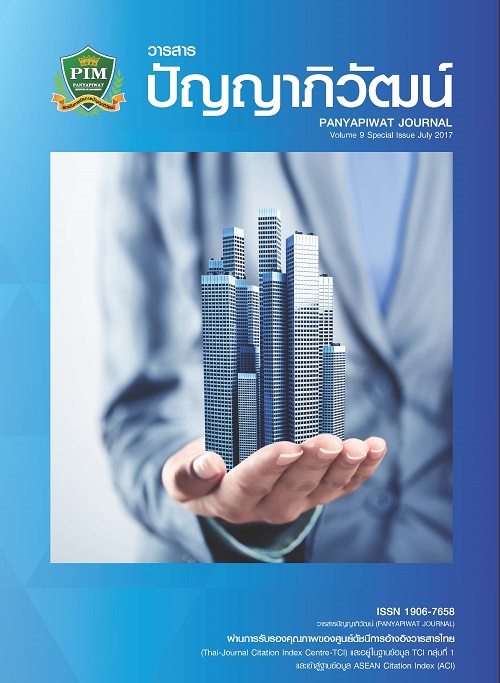การพัฒนารูปแบบการจัดการท่องเที่ยวอย่างยั่งยืนที่ส่งผลต่อการพัฒนามาตรฐานคุณภาพแหล่งท่องเที่ยวทางธรรมชาติของจังหวัดในเขตภาคกลาง
Main Article Content
บทคัดย่อ
งานวิจัยนี้มุ่งศึกษาระดับการจัดการท่องเที่ยวอย่างยั่งยืน ระดับมาตรฐานคุณภาพแหล่งท่องเที่ยวทางธรรมชาติ และพัฒนารูปแบบการจัดการท่องเที่ยวอย่างยั่งยืนที่ส่งผลต่อการพัฒนามาตรฐานคุณภาพแหล่งท่องเที่ยวทางธรรมชาติของจังหวัดในเขตภาคกลาง โดยวิเคราะห์ข้อมูลด้วยโมเดลสมการโครงสร้าง ตัวแปรเกณฑ์ คือ หลักการจัดการท่องเที่ยวอย่างยั่งยืน ตัวแปรพยากรณ์ คือ มาตรฐานคุณภาพแหล่งท่องเที่ยวทางธรรมชาติ ประชากร แบ่งเป็น 2 กลุ่ม คือ นักท่องเที่ยวที่ในแหล่งท่องเที่ยวทางธรรมชาติของจังหวัดในเขตภาคกลาง ในปี 2556 จำนวน 18,175,708 คน และประชาชนในแหล่งท่องเที่ยวทางธรรมชาติในจังหวัดนั้น ไม่ทราบจำนวน กำหนดกลุ่มตัวอย่าง ใช้โปรแกรม G*Power3.1 ได้กลุ่มตัวอย่าง กลุ่มละ 500 คน การสุ่มตัวอย่างแบบหลายขั้นตอน เครื่องมือที่ใช้ในการวิจัย ได้แก่ แบบสอบถามเกี่ยวกับระดับการนำหลักการจัดการท่องเที่ยวอย่างยั่งยืนมาปฏิบัติ ระดับมาตรฐานคุณภาพแหล่งท่องเที่ยวทางธรรมชาติ สถิติที่ใช้ในการวิจัย ได้แก่ ค่าเฉลี่ย และส่วนเบี่ยงเบนมาตรฐาน การวิเคราะห์โมเดลสมการโครงสร้าง
ผลการวิจัยพบว่า ประชาชนในแหล่งท่องเที่ยวมีการนำหลักการจัดการท่องเที่ยวอย่างยั่งยืนมาปฏิบัติ ในระดับมากที่สุด โดยมีการจัดเตรียมข้อมูลคู่มือบริการข่าวสารการท่องเที่ยวให้พร้อมสูงสุด มีระดับมาตรฐานคุณภาพแหล่งท่องเที่ยวทางธรรมชาติ อยู่ในระดับดีเยี่ยม โดยมีคุณค่าของแหล่งธรรมชาติสูงสุด
ผลการทดสอบสมมติฐานพบว่า หลักการจัดการท่องเที่ยวอย่างยั่งยืน มีส่งผลต่อมาตรฐานคุณภาพแหล่งท่องเที่ยวทางธรรมชาติของจังหวัดในเขตภาคกลาง ร้อยละ 36 โดยรูปแบบการจัดการท่องเที่ยวอย่างยั่งยืนควรเน้นหลักการจัดการท่องเที่ยวอย่างยั่งยืน 5 อันดับแรก ได้แก่ การประสานการพัฒนาการท่องเที่ยว การรักษาและส่งเสริมความหลากหลายของทรัพยากรธรรมชาติ การอนุรักษ์และการใช้ทรัพยากรอย่างพอดี การจัดเตรียมข้อมูลคู่มือบริการข่าวสารการท่องเที่ยวให้พร้อม และการวิจัยและติดตามผล
This research aimed to study the levels of Sustainable Tourism Management and Quality Standards of Natural Tourist Attractions, and to develop a model on Sustainable Tourism Management affecting developing Quality Standards of Natural Tourist Attractions of provinces in the central region. The data were analyzed by Structural Equation Modeling. The criterion variable was the principles on Sustainable Tourism and the predictor variable was the Quality Standards of Natural Tourist Attractions. The population was categorized into two groups: 18,175,708 tourist in Natural Attractions in the central region in 2013 (B.E. 2556) and the local people in the provinces located in the central region (unknown number). The 500 participants in the research were randomized by multi-stage sampling method using G*Power 3.1 Program. The research instruments were levels of implementation of Sustainable Tourism Principles and levels of the Quality Standards of Natural Tourist Attractions Questionnaire. The data were analyzed by mean, standard deviation, structural equation modeling analysis.
The results of the study indicated that the local people in the tourist attractions applied the Principles of Sustainable Tourism Management at the highest level provided with an instructional manual and information on tourism for preparations at the highest level. In terms of the quality standards of natural tourist attractions, they were evaluated at the excellent level with the value of the natural sources at the highest level.
The hypothesis testing results was the sustainable tourism management principles influenced the quality standards of natural tourist attractions in provinces located in the central region (36%). The Model of Sustainable Tourism Management should focus on the top five principles of sustainable tourism management including integrating tourism into planning, Maintain diversity, Using resource sustainable, marketing tourism responsibly and Undertaking research.
Article Details
“ข้าพเจ้าและผู้เขียนร่วม (ถ้ามี) ขอรับรองว่า บทความที่เสนอมานี้ยังไม่เคยได้รับการตีพิมพ์และไม่ได้อยู่ระหว่างกระบวนการพิจารณาลงตีพิมพ์ในวารสารหรือแหล่งเผยแพร่อื่นใด ข้าพเจ้าและผู้เขียนร่วมยอมรับหลักเกณฑ์การพิจารณาต้นฉบับ ทั้งยินยอมให้กองบรรณาธิการมีสิทธิ์พิจารณาและตรวจแก้ต้นฉบับได้ตามที่เห็นสมควร พร้อมนี้ขอมอบลิขสิทธิ์บทความที่ได้รับการตีพิมพ์ให้แก่สถาบันการจัดการปัญญาภิวัฒน์หากมีการฟ้องร้องเรื่องการละเมิดลิขสิทธิ์เกี่ยวกับภาพ กราฟ ข้อความส่วนใดส่วนหนึ่งและ/หรือข้อคิดเห็นที่ปรากฏในบทความข้าพเจ้าและผู้เขียนร่วมยินยอมรับผิดชอบแต่เพียงฝ่ายเดียว”
เอกสารอ้างอิง
Banmuang Newspaper. (2012). Department of Tourism given Thailand Tourism Standard for 39 sites of the 23 provinces in the 14th standard in the initial years. Retrieved October 4, 2013, from http://www.ryt9.com/s/bmnd/1555031 [in Thai]
Best, J. W. (1981). Research in Education. New Jersey: Prentice-Hill.
Department of Tourism. (2013). The Manual of natural tourist’s attraction quality standard evaluation. Bangkok: Bureau of Attraction Department, Department of Tourism, Ministry of Tourism and Sports. [in Thai]
Ieamsa-ard, N. & Thepsuwanchana, S. (2014). To maximize the potential of tourism in the inland of Surat Thani Province to support the ASEAN members. International Conference on Management Science, Innovation, and Technology 2014. Faculty of Management Sciences, Suan Sunandha Rajabhat University, p269-274. [in Thai]
Institute for Social Research Chulalongkorn University. (2009). Crisis with business ethics: Establishing good governance for sustainable business, 7 issues of Sustainable Tourism. The moral of the National Assembly 4th, 30 July - 1 August 2009. Hall 9 Impact Muangthong Thani Nonthaburi Province. [in Thai]
Jirapan, S. (2013). Opportunity of Thailand Tourism Business in ASEAN – AEC with University of the Thai Chamber of Commerce. Retrieved October 4, 2013, from http://www.ryt9.com/s/bmnd/1555031 [in Thai]
Office of Permanent Secretary, Ministry of Tourism and Sports. (2015). Tourism Economic Report. The Situation of World Tourism, 1st ed. July-September 2015, p1-44. [in Thai]
Phongviritthorn, R. & Phakavipas, B. (2013). The development of appropriate strategies to enhance the natural attractions standard in Chiang Mai Province A case study of Doi Inthanon National Park. Journal of Community Development Research (Humanities and Social Sciences), 7(1), 44-55. [in Thai]
TAT Intelligence Center, Tourism Authority of Thailand. (2015). Number of visitors in 2013. Retrieved February 17, 2015, from http://intelligencecenter.tat.or.th:8080/apex/f?p=1:22:0::NO::: [in Thai]
Thailand Institute of Scientific and Technological Research. (1999). Final report on the implemen-tation of policies for eco-tourism. Bangkok: Institute of Scientific and Technological Research. [in Thai]
Thongsong, C. (2014). A Concept for Developing Slow Tourism in Thailand.Research Methodology & Cognitive Science, 12(2), 1-12. [in Thai]


